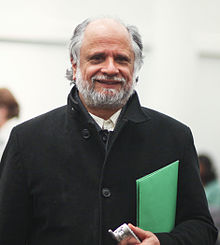Homi K. Bhabha
Jump to navigation
Jump to search

Homi Kharshedji Bhabha (/ˈbɑːbɑː/; born 1 November 1949) is an Indian scholar and critical theorist. He is the Anne F. Rothenberg Professor of the Humanities at Harvard University. He is considered one of the most important figures in contemporary postcolonial studies, and has developed a number of the field's neologisms and key concepts, such as hybridity, mimicry, difference, and ambivalence.
Quotes[edit]
- If, for a while, the ruse of desire is calculable for the uses of discipline soon the repetition of guilt, justification, pseudo-scientific theories, superstition, spurious authorities, and classifications can be seen as the desperate effort to `normalize’ formally the disturbance of a discourse of splitting that violates the rational, enlightened claims of its enunciatory modality.
- Homi K. Bhabha, The Location of Culture . (based on this sentence and work, in 1998, the journal Philosophy and Literature awarded Bhabha the second prize in its Bad Writing Competition) quoted from Malhotra, R. & Viswanathan V. (2022). Snakes in the Ganga : Breaking India 2.0. chapter 11 [1]
Quotes about Homi K. Bhabha[edit]
- It was our dream to get Homi Bhabha, said Henry Louis Gates Jr., chairman of the Afro-American studies department, where Mr. Bhabha will begin teaching in the spring. Reaction in the English department, where Mr. Bhabha will be spending the bulk of his time, was just as enthusiastic. He's manifestly one of the most distinguished cultural theorists of the postcolonial and diasporic experience in the world, said Lawrence Buell, the department chairman.
Elsewhere, however, news of the appointment, which was first announced a year ago, provoked less jubilation than disbelief. When I heard that, I was dismayed, said Marjorie Perloff, an emeritus professor of English at Stanford University. For Harvard to be thrilled to be hiring Homi Bhabha -- he doesn't have anything to say....
One could finally argue that there is no there there, beyond the neologisms and latinate buzzwords, said Mark Crispin Miller, a professor of media studies at New York University. Most of the time I don't know what he's talking about.- Harvard's Prize Catch, a Delphic Postcolonialist quoted also in Malhotra, R. & Viswanathan V. (2022). Snakes in the Ganga : Breaking India 2.0.
